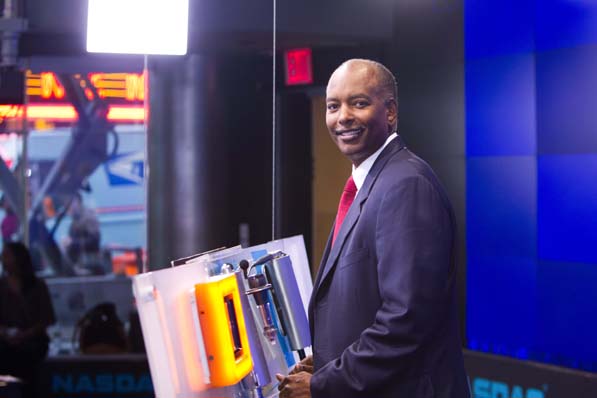
the strength of your physical offering, and be diligently devoted to a service culture. Those are a huge part of the responsibility of being good.” —Pace Cooper
After a long period of hardship between 2008 and 2011, Cooper Hotels has resumed its position as a thriving hotel developer and manager, now with approximately $100 million in annual revenue—a hurdle CEO Pace Cooper says it overcame by juggling priorities with panache. “We sometimes had to rob one pocket to pay the other, but we did it with great finesse,” he says.
The company’s creative approach to surviving the financial crisis shouldn’t have been a surprise to anyone familiar with its history. In 1962, Cooper’s father, Irby, a homebuilder, decided to get into the hotel business by developing and operating a franchise of Holiday Inn in the mountain resort village of Gatlinburg, Tennessee. At that time, the hotel chain was known for roadside locations that predominantly served business travelers, and Holiday Inn founder Kemmons Wilson cautioned Cooper’s father about his ostensibly ill-conceived plan. Irby persevered, however, and his plan was a success.
Over the next four decades, Cooper Hotels fine-tuned its business model, which today involves franchising in clusters. Franchising, says Cooper, is an easy way to connect with customers, who make quick decisions to purchase hotel stays when they can easily identify the brand, and today the company operates under the Hilton and InterContinental brands. Developing and operating several hotels in the same location, meanwhile, creates operating efficiencies, primarily with regard to leadership. “We have one person supervising each cluster, and clusters share sales and maintenance staff as well,” Cooper says.
The three hotels in the company’s Detroit airport cluster even share the same van service, although that can’t be repeated at Cooper Hotel’s other two clusters, in
Tennessee and Florida, where hotels are more dispersed.
However, clustering, as an operating strategy that positioned the Cooper Hotels for growth, assumes a normal economic environment—but normal went out the window in 2007. As the economy slowed, business slowed precipitously and property values fell, but that’s not what hurt the hotel business the most. “It was the credit crisis,” Cooper explains. “The platform that regulators and lenders used to analyze a property’s viability became so conservative that suddenly all of these folks in the industry, folks who had very conservatively financed their operations with strong equity contributions and low levels of debt, found themselves very suddenly underwater.”
Cooper Hotels
Building a hotel empire
1962
Irby Cooper cofounds Cooper Hotels with the opening of a Holiday Inn
in Gatlinburg, TN
1982
Cooper Hotels opens Hilton Hotels and Promus Hotels franchises
1985
Irby’s son, Pace, joins the family business
1996
Pace’s siblings, David and Laurie, join the family business
2000
Irby passes away, leaving Pace as CEO
2002
Hilton and Promus merge, leaving the company with 10 hotels under a unified brand
2012
Cooper Hotels operates 15 Hilton hotels and 5 InterContinental hotels
What Cooper calls “the deepest economic hit I’ve ever seen, and the most trying period of my career,” has now passed, and the hotel business is on the cusp of recovery. But how Cooper Hotels survived to tell the tale is a story Irby would be proud of. “We were deep into development when harder times hit, yet we managed to develop five or six hotels between late 2007 and 2009,” recalls Cooper.
To survive the turbulent times, the Cooper Hotels management took the expected steps of being more fiscally responsible by lowering expenditures to meet the drop in sales volume that the hotels were experiencing. The company’s most important survival strategy, however, was the management of its banking relationships. “Lenders were panicking, and all of them were worried that we wouldn’t be able to meet all of our obligations, so we’d pay a handful of lenders and leave others in the lurch,” explains Cooper. “We responded by letting all of our banks know we were committed to staying on course with our obligations, and asking them to try to maintain a level of confidence that we would be one of the survivors and emerge from this crisis even stronger. It involved a much higher level of communication than ever before.”
Navigating the storm with a conveyance of calm encouraged Cooper Hotels’ lenders to be patient and allowed the company to emerge stronger, just as it had promised. “We think we’re poised to capitalize on a strengthening economic environment and once again claim a small spot as one of the really high-quality development and management companies,” Cooper says.
Ever in keeping with the company’s creativity, Cooper admits that in hindsight, there are certainly things he would have changed. “A lot of people think the hotel
industry is based on revenue stream, so when times get better and sales volume climbs, profits rise,” he says. “Certainly, that’s important; but at the end of the day, there’s a much bigger picture to consider. You have to look at the timing of capital events, which include refinances and sales. Looking back over the past 10 or 20 years, we see cycles of strength and weakness in the overall macroeconomic picture, and we probably would have done a better job if we had identified those trends, selling some properties at the peak and redeploying the cash at the valleys.”
Even Irby, after all, didn’t have a crystal ball.

